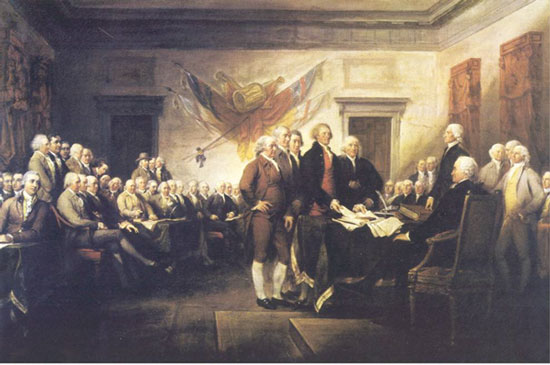|
 Declaring
Independence
Declaring
Independence

More than a year past between the outbreak of fighting at the
battles of Lexington and Concord and the decision to issue the
Declaration of Independence. The major reason for the delay was
the high value that the colonists attached to unanimity. While
New England, Virginia, and South Carolina were ready to declare
independence in 1775, other colonies still hoped that British
merchants or the parliamentary opposition would respond to American
grievance. Many feared that a full-scale war for independence
might give France and Spain the opportunity to expand their New
World empires.
After
the outbreak of violence, pressure began to build for a formal
declaration of independence. During the Spring of 1776, colonies,
localities, and groups of ordinary Americans--including New York
mechanics, Pennsylvania militiamen, and South Carolina grand juries--adopted
resolutions endorsing independence.
On
June 7, 1776, a Virginia delegate forced the delegates to take
a stand. Richard Henry Lee offered a resolution calling for an
immediate declaration of independence. His resolution read:
That
these United Colonies are, and of right out to be, free and
independent States, that they are absolved from all allegiance
to the British crown, and that all political connection between
them and the state of Great Britain is, and ought to be, totally
dissolved.
That
it is expedient forthwith to take the most effectual measures
for forming foreign alliances.
That
a plan of confederation be prepared and transmitted to the representative
colonies for their consideration and approbation.
Four
days later-three weeks before Congress actually voted on Lee's
resolution-the Continental Congress appointed a committee consisting
of Thomas Jefferson, John Adams, Benjamin Franklin, Roger Sherman,
and Robert R. Livingston to draft a declaration of independence.
According
to John Adams, Jefferson suggested that Adams write the first
draft. Adams later recalled the conversation:
I
said, "I will not," "You should do it."
"Oh! no." "Why will you not? You ought to do
it." "I will not." "Why?" "Reasons
enough." "What can be your reasons?" "Reason
first, you are a Virginian, and a Virginian ought to appear
at the head of this business. Reason second, I am obnoxious,
suspected, and unpopular. You are very much otherwise. Reason
third, you can write ten times better than I can." "Well,"
said Jefferson, "if you are decided, I will do as well
as I can." "Very well. When you have drawn it up,
we will have a meeting."
The
committee delegated Thomas Jefferson to undertake the task. Jefferson,
who was just 33 years old, was the Continental Congress's youngest
member.
The
draft was reviewed first by Adams, followed by Benjamin Franklin,
and then by the entire committee. The committee made forty-seven
alterations in Jefferson's draft and inserted three new paragraphs.
The revised draft was presented to Congress on June 28.
In
a famous clause that was ultimately deleted from the Declaration
of Independence, Thomas Jefferson (1743-1826) cited the African
slave trade as one of the examples of British oppression. Jefferson
refers to the English government's repeated vetoes of attempts
by colonial legislatures to restrict or halt the importation
of slaves. Virginia, especially, had profited from a great
natural
increase in its slave population and had no desire for a further
slave "surplus" or for competition with its own profitable
practice of selling slaves to South Carolina and Georgia.
After
voting for independence on July 2, the Congress then continued
to refine the document, making thirty-nine additional revisions
to the committee draft and trimming the document by a third before
finally adopting the declaration on the morning of July 4.
The
most radical idea advanced by the American Revolutionaries was
the proposition set forth in the Declaration of Independence that
"all men are created equal, that they are endowed by their
Creator with certain Unalienable Rights, that among these are
Life, Liberty, and the pursuit of Happiness." In 1856, Senator
Rufus Choate (1799-1859) would dismiss this phrase as "glittering...generalities"
(prompting the philosopher Ralph Waldo Emerson (1803-1882) to
quip: "Glittering generalities? They are blazing ubiquities!").
One
of the most important themes in American history involves the
repeated effort to extend the meaning of the "inalienable
rights" with which Americans are endowed and adopt a more
inclusive definition of those who are "created equal."
In the decades preceding the Civil War, reformers pictured their
efforts to improve the nation's educational system and to abolish
slavery as attempts to realize the republican ideals enshrined
in the Declaration of Independence.
Proponents
of abolition, women's rights, world peace, and other reforms drafted
"Declarations of Sentiments" modeled on the wording
of the Declaration of Independence. Workingmen's parties in New
York and Philadelphia in the 1820s, abolitionists in the 1830s,
and advocates of women's rights in 1848 each issued declarations
listing a "history of repeated injuries and usurpations"
that justified their proposed reforms. Convinced that the sacred
principles of the revolution had been corrupted, reformers sought
to revive the Spirit of 1776 by exposing a host of abuses that
contradicted the nation's revolutionary principles.
Exploration 1: Declaring Independence
1.
What was the Declaration of Independence's primary purpose?
2.
Who was its intended audience?
3.
On what grounds does the document justify the colonists' demand
for political independence? Do you find these reasons persuasive?
4.
Some eighty-six alterations were made between Jefferson's original
draft and the version ultimately adopted by the Second Continental
Congress. What are the most significant changes? Why do you
think Congress made those changes? Did the alterations strengthen
or weaken the document?
5.
One of the most significant changes involved delete Jefferson's
discussion of slavery. What did Jefferson have to say about
slavery in the original draft? Why do you think Congress removed
this section of the Declaration?
6.
Why doesn't the Declaration refer to the British Parliament
and why does it place so much emphasis on the actions of the
king?
7.
What did Jefferson mean when he wrote that "all men are
created equal, that they are endowed by their Creator with certain
unalienable Rights"?
Resources:
|
